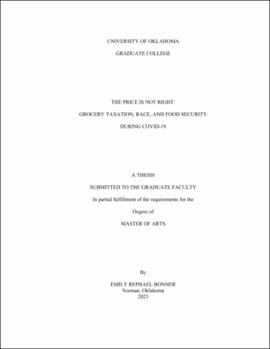| dc.contributor.advisor | Bass, Loretta | |
| dc.contributor.author | Bonner, Emily R. D. | |
| dc.date.accessioned | 2023-05-12T13:28:38Z | |
| dc.date.available | 2023-05-12T13:28:38Z | |
| dc.date.issued | 2023-05-12 | |
| dc.identifier.uri | https://hdl.handle.net/11244/337651 | |
| dc.description.abstract | Using recent data from a national sample of 2.8 million households surveyed by the Household Pulse Survey (HPS) (U.S. Census Bureau 2022), this research examines the relationships across food insecurity, grocery taxes, and race during the COVID-19 pandemic. This research asks: How does a respondent’s household food insecurity differ in states that impose grocery taxes compared to states without grocery taxes? How does a respondent’s food insecurity differ by their race? How do these trends reflect government COVID-19 relief policy during this time? This analysis provides a baseline reporting of factors associated with food insecurity during the Covid-19 pandemic using the most recent HPS data. Overall, 35% of respondents report being food insecure at some point during the pandemic. Using survey-weighted logistic regressions and controlling for background demographic and socio-economic variables, this research finds that food insecurity is higher for respondents living in states with grocery taxes compared to those in states without grocery taxes. As the pandemic progresses, a substantial gap in food insecurity is observed; respondents in states with grocery taxes reported higher food insecurity compared to respondents in states without grocery taxes, net of other effects. This research also finds that food insecurity is a more salient issue for Black respondents; Black households in states with grocery taxes have a 43% predicted probability of reporting current food insecurity compared to 34% for white respondents in states without grocery taxes, net of the other covariates. Grocery taxes and being Black negatively affect food security during the Covid-19 pandemic. | en_US |
| dc.rights | Attribution-NonCommercial-NoDerivatives 4.0 International | * |
| dc.rights.uri | https://creativecommons.org/licenses/by-nc-nd/4.0/ | * |
| dc.subject | food insecurity | en_US |
| dc.subject | grocery tax | en_US |
| dc.subject | race | en_US |
| dc.subject | pandemic | en_US |
| dc.title | The Price Is Not Right: Grocery Taxation, Race, and Food Security During COVID-19 | en_US |
| dc.contributor.committeeMember | Peck, B. Mitchell | |
| dc.contributor.committeeMember | Burns, Thomas | |
| dc.date.manuscript | 2023-05 | |
| dc.thesis.degree | Master of Arts | en_US |
| ou.group | Dodge Family College of Arts and Sciences::Department of Sociology | en_US |
| shareok.nativefileaccess | restricted | en_US |

